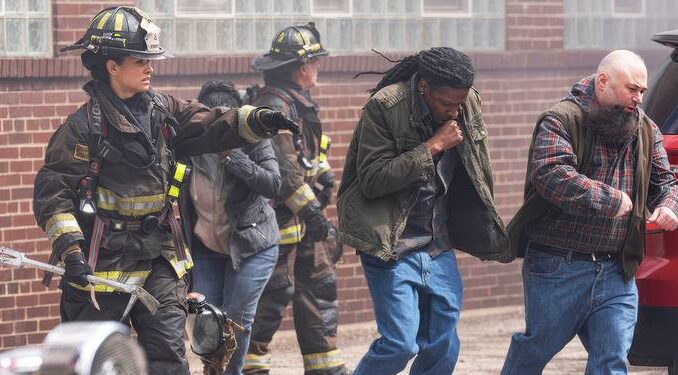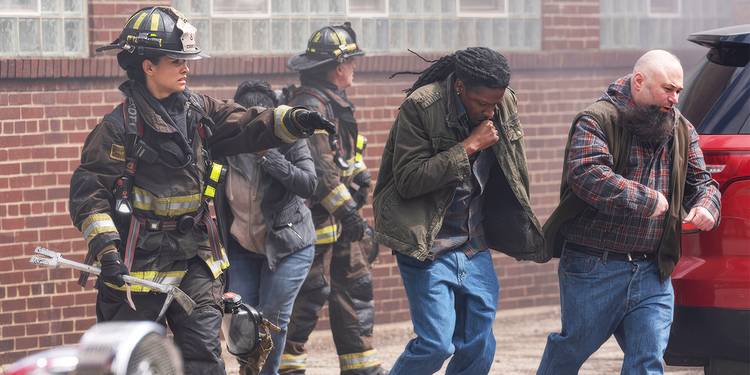
The Unseen Fault Line: A Classic Chicago Fire Episode That Quietly Warns of What’s Coming Next for 51
Chicago Fire is a masterclass in controlled chaos, a high-wire act performed without a net. Yet, amidst the explosions, collapsing buildings, and heart-wrenching rescues, the show possesses a quieter, more insidious skill: the art of the subtle warning. It’s in these moments, often tucked between a heroic save and a locker room banter, that the true genius of the series shines, hinting at the seismic shifts about to rattle Firehouse 51. Imagine a classic episode – let’s call it “The Unseen Fault Line” – that perfectly encapsulates this silent prophecy, leaving the audience with an unsettling feeling long after the sirens fade.
The episode opens with the familiar comfort of the firehouse: the hum of anticipation, the camaraderie of breakfast, Herrmann’s latest rant about a poorly parked truck. Everything feels normal. But the first tremor comes with the call itself: a seemingly routine structural fire in an old, multi-story apartment building. It’s not a five-alarm blaze, but a stubborn, smoldering inferno that demands precision and patience. As Squad 3 and Truck 81 enter, the show’s signature tension mounts. Severide, ever the intuitive leader, pauses at the threshold, a fleeting frown creasing his brow as he studies the building’s façade – a micro-expression the audience catches, but his team, focused on the task, misses. It’s the first crack in the façade of routine.
Inside, the call quickly devolves. What was thought to be a contained attic fire reveals itself to have spread through hidden voids, compromising the entire structure. Casey, leading Truck 81, makes a critical decision to pull back a team just moments before a section of ceiling collapses. The near-miss is palpable, the collective breath held. But the warning isn’t in the danger itself – that’s standard for 51. It’s in Casey’s eyes afterwards: not just the usual exhaustion, but a deeper weariness, a moment of profound doubt that flickers across his face as he looks at his crew. He’s always been the rock, but in this episode, the rock feels precariously balanced. A brief, almost unheard conversation later sees him receive a call from an alderman’s aide, a quick nod and a “yes, I’ll consider it” spoken with a distant look, suggesting a world beyond the firehouse walls might finally be catching his attention.
Meanwhile, Severide, usually a lone wolf in his element, finds himself in an uncharacteristic moment of hesitation during the search and rescue. A trapped victim is under a precarious beam, and instead of his usual decisive command, he falters for a crucial second, almost imperceptibly, before Mouch’s steady voice from behind him snaps him back. Later, back at the firehouse, Stella Kidd observes him poring over old blueprints, not for a current case, but for a seemingly unrelated OFI investigation from years past – a subtle hint that his passions might be pulling him in a new, less predictable direction, potentially away from the day-to-day grind of Squad 3. The firehouse family, built on the unwavering leadership of these two men, feels a subtle shift, like tectonic plates grinding beneath the surface.
Even the ancillary characters contribute to this quiet symphony of foreboding. Herrmann, typically boisterous and ever-present, spends a significant portion of the episode unusually subdued, nursing a simmering concern about the dwindling number of active firefighters in the CFD, muttering about “old timers moving on” and “not enough new blood to fill the gaps.” It’s a throwaway line in the context of the episode’s main action, but it plants a seed of staffing shortages, of Firehouse 51 potentially losing cherished members. Ritter, usually the optimistic and steady presence, finds himself taking charge on a small, contained incident during the call, demonstrating a nascent leadership that, while admirable, also subtly implies a future where he might be forced to step into bigger shoes, a future that necessitates a void to fill.
The episode ends not with a dramatic cliffhanger, but with a lingering shot. The firehouse is quiet, the trucks gleaming, but the usual bustling energy is replaced by a strange tranquility. Casey is alone in Boden’s office, staring out the window, a profile of quiet contemplation. Severide is in the common room, not with Stella, but lost in thought over his blueprints. Herrmann sighs deeply as he locks up Molly’s. There’s no explicit warning, no urgent meeting, no character declaring a life-altering decision. Instead, there’s an ambient unease, a pervasive feeling that the ground beneath Firehouse 51, long thought unshakeable, has developed an unseen fault line. “The Unseen Fault Line” wouldn’t be celebrated for its explosions, but for its masterful use of subtext, where a quiet glance, a whispered phone call, or a moment of uncharacteristic hesitation speaks volumes, warning of the monumental changes just around the corner for the beloved family of 51.
